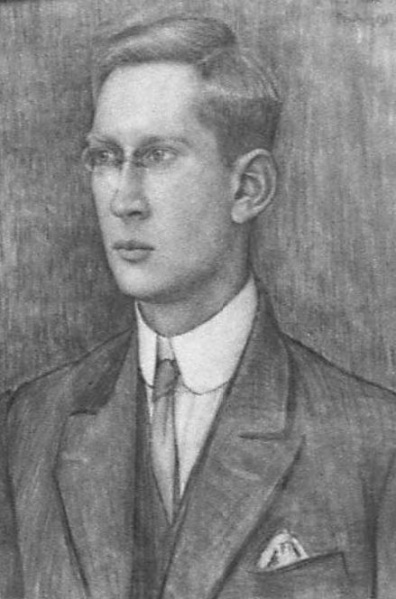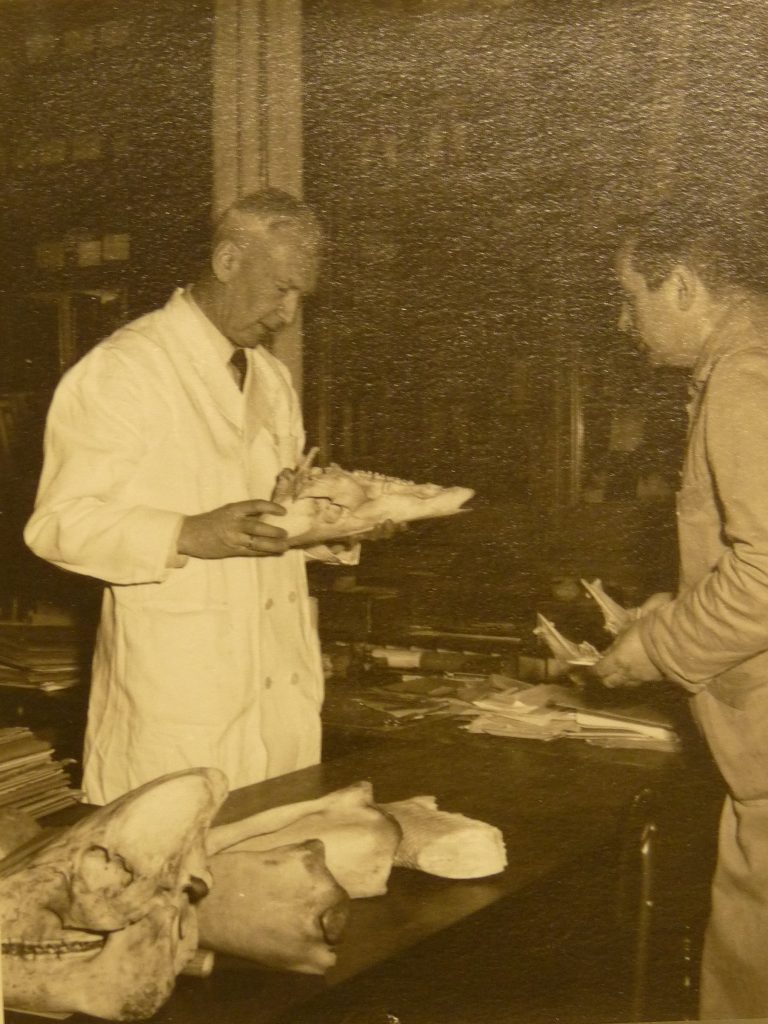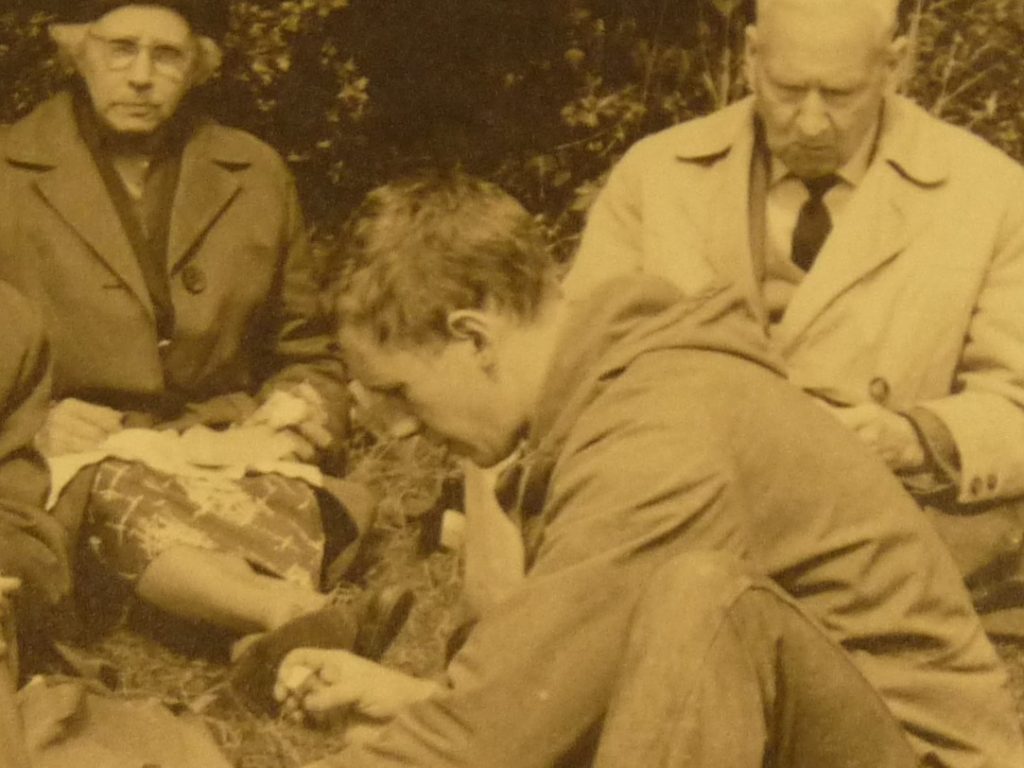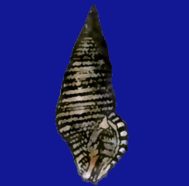In the previous blog we saw how Tera and Pico are getting older. Tera suffers a cerebral hemorrhage and Pico dies in August 1987. This blog is dedicated to Pico who has played such an important role in Tera’s life since the 1920s.
Pieter Jacobus (Pico) van der Feen was born in Stratum (now part of Eindhoven) in 1892, where his father is a court clerk. The van der Feen family is a Zeeland family, Dutch Reformed and wealthy. Pico’s father had been married before and had become a widower in 1887, after his wife had died in childbirth. Father already has two sons from his first marriage. Both brothers play no further important role in Pico’s life.
In 1903 the family moves to Domburg where they take up residence in Villa De Wael. Father van der Feen has the villa thoroughly renovated.

Pico goes to grammar school in Middelburg. After that he will study biology in Utrecht.
Tera’s first mention of Pico is on June 7, 1921 in her diary: Van der Feen from Utrecht comes round, tells all kinds of stories over coffee at Nons
So Pico studies in Utrecht and then works for years in Utrecht under Professor Jordan, where he conducts numerous studies in the field of physiology. He also works at the brain institute in Amsterdam under Professor Ariens Kappers, all before the Second World War.
When his mother became infirm, Pico moved back in with his parents at the Wael. In Zeeland he focused on archeology and paleontology, then fairly new scientific fields in the Netherlands. Hendrik Engel writes in honor of Pico’s 80th birthday in 1972: “When his mother, Mrs. van der Feen-de Bats, needed his help because of her age, he didn’t hesitate for a moment and came to live with her again in Domburg, to be able to give her all the help she needed which, as a son, he felt he owed his mother. What’s more important? One may ask, for van der Feen there was no problem in this, he always did what his hands found to do and what he considered most important at the time. A typical character trait emerges here. When his help was needed in any way, he did not hesitate long, but gave it, his own affairs, his interests, his future being no consideration for him. He had a strong feeling for the relativeness of many things that are extremely important to others.
Pico’s father dies in 1941. During the war, Pico writes with Tera. They got engaged in 1933. Secretly; probably because Pico’s mother would disapprove of her son’s engagement and marriage and, according to some, threatened to disinherit him. When Walcheren is evacuated, Pico and his mother find shelter in Ginneken near Breda. His mother dies in Breda in December 1944. After the liberation of the Northern Netherlands, contact with Tera is restored and the couple marries on August 24, 1945 in Amsterdam. In the first years of their marriage, Pico often travels up and down to Zeeland to restore the Wael to its former glory, but also to contribute to the Zeeuws museum, which also needed extra attention after the war.
In 1950 a position becomes available at the Zoological Museum in Amsterdam, where he is charged with the management of the mammals department. His goal is still to obtain a PhD with a dissertation on mammoths. The museum changed after the war and expanded. Engel writes: He helped to renew the old exhibition spaces, setting up temporary exhibitions in addition to the permanent ones.

It started with the one about “the land of Heimans and Thijsse”, in which his interest in the history of biology in general and the Netherlands in particular, as well as his experience in popularizing science, as he had practiced it in Zeeland, when he had to arouse the interest of laymen there, came to the aid of all of us. I have often felt embarrassed when I could not let him work quietly on his elephants, but his interests were so lively and wide, his views and knowledge so wide-ranging, that it was a pleasure, indeed a necessity, to call for his assistance and ask for his opinion.
Pico published a lot in the fifties and continues to work on a dissertation, but his interests are so broad that there are always new aspects that must or can be investigated. Engel writes: As van der Feen grew older, the deeper insight of the wise biologist, who was still inspired with youthful fire, made him realize how little important the doctorate and a voluminous dissertation would ultimately be compared to the work his hands found to do in helping young people and encouraging many different directions of research……

Tera and Pico’s marriage is described as very good by everyone. They were always together and very much on their own, they lived in their own world, people say “in the village”. Tera herself says that it is nice to be married to a man who “knows what you are talking about”. After their marriage, they often go on national and international excursions together. On the photo you see them on an excursion to Cambridge (1962), the man in the foreground is unknown.
All his work will never lead to a dissertation or a PhD, not even after he officially retired in 1957. Pico then remains active at the Zoological Museum until the retirement of Tera, who receives an honorary doctorate there in 1964. Engel writes about this: He enjoyed the fact that his wife was honored with an honorary doctorate and was appointed Officer in the Order of Orange Nassau by Her Majesty, but it proves his great and calm self-esteem that this did not directed him towards feelings of inferiority that other men might experience in such cases, he simply rejoiced in his wife’s success and calmly went his own way: helping where he could help, doing what came directly on to his path in life. One could perhaps regret this and call it a fragmentation of attention, for him it was only important to help here and now, where he immediately found it necessary.
After their final move from Amsterdam to Domburg, both Pico and Tera are working on the Encyclopedia of Zeeland. Pico in particular will travel throughout Zeeland between 1965 and 1984 on his bicycle to collect information for the encyclopedia. He also remains interested in the history of Zeeland, the Nehalennia myth, but also in helping young people, such as the Labruyere children, who receive extra lessons from him.
Under Engel’s article in the Zeeuws Tijdschrift (Magazine), the society writes this message:
On April 10, 1972 Drs. Pieter Jacobus van der Feen celebrated his eightieth birthday. Although he is not at the forefront of the list of important Zeelanders – and does not want to be – Van der Feen is known to everyone in Zeeland who has something to do with zoology – his specialty – archaeology, paleontology and history. Many who knocked on his and his wife’s door for information and advice have never returned home empty-handed. The hospitable house “De Wael” in Domburg is always open to those in need of human and scientific support. ….. To this day, his wife, Dr. W.S.S. van Benthem Jutting, and he extended their concern over a number of collections of the Royal Zeeuws Genootschap der Wetenschappen.
This dedication is rewarded with an honorary membership of the Zeeuws Genootschap.
Pico finishes work on the Zeeland Encyclopedia in 1984. His 95th birthday is celebrated in April 1987 and Pico dies in August 1987, 2 days before their 42nd wedding anniversary.
In the next blog we will read how Tera says goodbye to de Wael.
